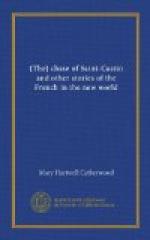“Why should it embroil you with the tribe,” argued the merry sitter, “if we warm our heels decently at this ready fire until the Indians light our own? Any Christian, white or red, would grant us that privilege.”
“If I enter with you, will you come out with me as soon as I make you a sign?”
“Doubt it not,” said La Hontan, and he eclipsed himself directly.
Though Saint-Castin had been more than a year in Acadia, this was the first time he had ever seen Madockawando’s daughter. He knew it was that elusive being, on her way from her winter retreat to the tribe’s summer fishing station near the coast. Father Petit, the priest of this woodland parish, spoke of her as one who might in time found a house of holy women amidst the license of the wilderness.
Saint-Castin wanted to ask her pardon for entering; but he sat without a sound. Some power went out from that silent shape far stronger than the hinted beauty of girlish ankle and arm. The glow of brands lighted the lodge, showing the bark seams on its poles. Pale smoke and the pulse of heat quivered betwixt him and a presence which, by some swift contrast, made his face burn at the recollection of his household at Pentegoet. He had seen many good women in his life, with the patronizing tolerance which men bestow on unpiquant things that are harmless; and he did not understand why her hiding should stab him like a reproach. She hid from all common eyes. But his were not common eyes. Saint-Castin felt impatient at getting no recognition from a girl, saint though she might be, whose tribe he had actually adopted.
The blunt-faced Etchemin woman, once a prisoner brought from northern Acadia, now the companion of Madockawando’s daughter, knew her duty to the strangers, and gave them food as rapidly as the hunter could broil it. The hunter was a big-legged, small-headed Abenaqui, with knees over-topping his tuft of hair when he squatted on his heels. He looked like a man whose emaciated trunk and arms had been taken possession of by colossal legs and feet. This singular deformity made him the best hunter in his tribe. He tracked game with a sweep of great beams as tireless as the tread of a modern steamer. The little sense in his head was woodcraft. He thought of nothing but taking and dressing game.
Saint-Castin barely tasted the offered meat; but La Hontan enjoyed it unabashed, warming himself while he ate, and avoiding any chance of a hint from his friend that the meal should be cut short.
“My child,” he said in lame Abenaqui to the Etchemin woman, while his sly regard dwelt on the blanket-robed statue opposite, “I wish you the best of gifts, a good husband.”
The Etchemin woman heard him in such silence as one perhaps brings from making a long religious retreat, and forbore to explain that she already had the best of gifts, and was the wife of the big-legged hunter.
“I myself had an aunt who, never married,” warned La Hontan. “She was an excellent woman, but she turned like fruit withered in the ripening. The fantastic airs of her girlhood clung to her. She was at a disadvantage among the married, and young people passed her by as an experiment that had failed. So she was driven to be very religious; but prayers are cold comfort for the want of a bouncing family.”




